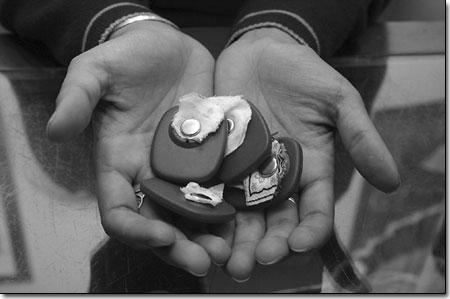|
Long-standing problem is not going away
by Missy Votel
 |
| Employee Kamaljit Punia displays
the security tags that were torn from merchandise at the Animas
Trading Co. Store manager Kathy Wakeman estimates the two
female suspects, who have been apprehended, made off with
around $300 in clothing. She said similar occurrences take
place every two or three months at the store. /Photo by Todd
Newcomer. |
Last week, Cathy Wakeman slowly started piecing things together:
an empty hanger here, a stray tag there. Then an employee at Animas
Trading Co., a Main Avenue clothing and accessory shop where Wakeman
is manager, stumbled upon the motherlode: a pile of about seven
clothing tags stashed behind a “Stealing is Bad Karma”
sign in the store’s dressing room. That’s when Wakeman
realized she had been hit – again.
“That stack of tags was big, about $300 in one haul,”
she said. “That’s a good portion of one day of sales.”
Wakeman, who has been the manager at Animas Trading for 10 years,
said although the most recent theft was particularly large, it
is not out of the ordinary.
“We’ll find a stack every two or three months,”
she said.
Wakeman is not alone. Shoplifting is a problem that plagues businesses
up and down Main Avenue and throughout Durango, despite the use
of security tags and alarm systems.
Between Jan. 1 and March 31 of this year, Durango Police responded
to 191 theft calls, the majority of which were for shoplifting,
said Capt. Dale Smith.
“We get a lot of calls,” he said. “Theft and
shoplifting are big issues in the community.”
Smith said that the town tends to see a rise in shoplifting every
summer, something that Wakeman concurs with.
“There seems to be a rash of it when school gets out and
throughout the summer it just seems to be more frequent,”
she said.
 |
Shoppers peruse the compact discs at Southwest
Sound on Sunday afternoon.
Despite the use of cameras, security tags and alarms, many
downtown merchants still experience problems with shoplifters.
Durango police go out on about three shoplifitng calls a day,
and Robert Stapeleton, owner of Southwest Sound, estimates
he has caught five shoplifters in the past year./Photo by
Todd Newcomer. |
Smith said that many shoplifters tend to be young adults. However,
he was quick to point out that shoplifters come in all ages and
from all walks of life. They also can run the gamut from petty
first-timers to experienced professionals.
“Two or three months ago, the Durango and Farmington police
broke up a shoplifting ring of Farmington people who were stealing
computers and stuff from Home Depot and then turning around and
selling it at flea markets in Farmington,” he said. “We
see that kind of stuff frequently.”
Wakeman said she believes the same circle of thieves has been
hitting up her store.
“It seems we have a group of the same people who are doing
it,” she said. “They’re coming in and taking
lots at a time.”
In the most recent case at Animas Trading, two thieves (who were
later caught) cut holes in the clothing in order to remove the
security tags. Wakeman said the two worked in tandem, with one
distracting the salesperson while the other stole clothing she
had brought into the dressing room.
She said the salesperson on duty thought something was suspicious
but didn’t act on it.
“The girl who was working that night thought something
was fishy when they left,” she said.
Robert Stapleton, owner of Southwest Sound, another Main Avenue
retailer, said despite a brand new security system, cameras and
factory-installed tags inside each CD case, personal contact is
probably the best way to stem theft.
“The biggest deterrent is customer service,” he said.
“Saying ‘Can I help you?’ without being mean
or accusatory.”
Stapleton said often if someone is guilty, they end up getting
nervous when confronted and then leave.
“That and letting them know we have cameras and letting
the alarm go off every so often just to let people know we’re
watching,” he said.
Wakeman said she also instructs her employees to circulate throughout
the store, make eye contact with shoppers, and if they have any
doubt about someone, request to search their bags. However, she
notes it can be hard for employees to accuse someone and run the
risk of being wrong.
“Even if you’re 99 percent sure, there’s that
1 percent of doubt of accusing someone who’s innocent and
that’s tough,” she said.
 |
A sign attached to the dressing room
at the Animas Trading Co. tries to
help deter any five-fingered discounts./ Photo by Todd Newcomer. |
Smith said fellow shoppers also can play a role in stopping thieves.
“If people think more people are watching than just the
store clerk, they won’t steal,” he said.
However, Smith admitted there is a certain laissez faire attitude
associated with people who witness a crime but don’t want
to get involved. Wakeman said she believes this is especially
true among younger people, who often adhere to a strict no-tattling
code. She said that was the case with her recent alleged shoplifters,
two Fort Lewis College students who were caught on a tip from
a fellow student.
“That’s a tough thing for kids to come and say, ‘I
know who did it,’” she said.
However, Smith said people who think stealing doesn’t affect
them are wrong.
“Businesses have to make up the profit somewhere, and that
largely results in higher prices,” he said.
Stapleton said he must sell several CDs to make up for one stolen
one. He has not done an inventory since buying the store last
spring, but an informal tracking system has so far turned up about
70 missing titles. He said he finds about one empty jewel case
a week, ranging from Billy Holliday and Creedence Clearwater Revival
to electronica.
“That leads me to believe it’s different people,”
he said.
Like Smith, Stapleton, who has worked at Tower Records in both
Southern California and Boston, said it is hard to stereotype
the typical shoplifter.
“I’ve done this for 35 years, and I’ve never
been more amazed at the types of people I’ve caught, from
celebrities to kids to guys in business suits,” he said.
Stapleton said although types of thieves vary, they typically
do it for one of three reasons.
“Some do it for the thrill, some because they don’t
have money and some because they are plain evil,” he said.
Capt. Smith said most shoplifters are caught after having done
it for a while.
“Rarely are they caught on the first time,” he said.
However, he said with most misdemeanor (up to $500) shoplifters,
the prospect of up to a $1,000 fine and 90 days in jail is all
it takes to get them on the straight and narrow.
“Once they’re caught or charged or put into a diversion
program or released to their parents, it seems to have a bigger
impact,’ he said. “They get the message it is a serious
problem.”
However, Stapleton wishes shoplifters would get the message a
lot sooner.
“It’s all for the thrill, but there’s got to
be something else out there that you can do,” he said.
|

